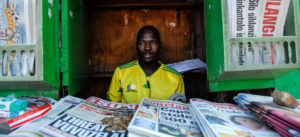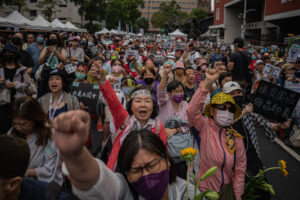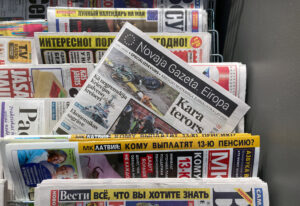January 2025, Volume 36, Issue 1
Hong Kong’s Native Son
A review of The Troublemaker: How Jimmy Lai Became a Billionaire, Hong Kong’s Greatest Dissident, and China’s Most Feared Critic, by Mark L. Clifford.
January 2025, Volume 36, Issue 1
A review of The Troublemaker: How Jimmy Lai Became a Billionaire, Hong Kong’s Greatest Dissident, and China’s Most Feared Critic, by Mark L. Clifford.
July 2024, Volume 35, Issue 3
A review of The Death of Truth, by Steven Brill, and Invisible Rulers: The People Who Turn Lies into Reality, by Renée DiResta.
April 2024, Volume 35, Issue 2
A review of How to Win an Information War: The Propagandist Who Outwitted Hitler, by Peter Pomerantsev.
April 2023, Volume 34, Issue 2
A review of Beijing’s Global Media Offensive: China’s Uneven Campaign to Influence Asia and the World by Joshua Kurlantzick.
April 2022, Volume 33, Issue 2
China’s ability to shape the global entertainment industry extends well beyond films, and it no longer rests solely on the allure of big markets. Beijing is exerting newfound leverage that is making giant U.S. media companies do its bidding.
January 2022, Volume 33, Issue 1
China is expanding its global media footprint, aggressively peddling its preferred narratives and stifling criticism of its policies, all the while undermining free expression, public debate, and electoral integrity in more open societies.
January 2022, Volume 33, Issue 1
Information is being weaponized against democracy. Democratic societies need new ways to keep media free, accurate, and authentic.
October 2020, Volume 31, Issue 4
The People’s Republic of China uses massive amounts of propaganda to influence how it is perceived beyond its borders. “Big data” reveal how that image is carefully and deliberately shaped for different audiences in different places.


April 2020, Volume 31, Issue 2
Sub-Saharan African governments are clamping down on media freedom. More surprising is how many of their citizens appear to support this attack on the press.


January 2020, Volume 31, Issue 1
Democracies are grappling with an era of transformation: Identity is increasingly replacing economics as the major axis of world politics. Technological change has deepened social fragmentation, and trust in institutions is falling. As our most basic assumptions come under question, can liberal democracy rebuild itself?
January 2020, Volume 31, Issue 1
A review of This Is Not Propaganda: Adventures in the War Against Reality by Peter Pomerantsev.
July 2019, Volume 30, Issue 3
Within Ukraine, Russia’s 2014 invasion has generated unprecedented pressures to impose restrictions on speech. While international norms allow some censorship during wartime, some of Ukraine’s new media and cultural policies raise risks not only for its democracy, but for its security as well.
January 2019, Volume 30, Issue 1
In the world’s largest democracy, liberalism is in retreat, as evidenced by a pattern of assaults on minorities, press freedom, and the independence of key cultural and intellectual institutions.
January 2019, Volume 30, Issue 1
Charges that Prime Minister Narendra Modi and his party threaten liberal-democratic safeguards are best understood as the overheated reaction of an insular elite that is still struggling to come to terms with its democratic displacement from power.
July 2017, Volume 28, Issue 3
Since Tanzania’s 2015 elections, rising repression and opposition protest have displaced an older dynamic of comparatively restrained and unchallenged dominance by the ruling party.

April 2017, Volume 28, Issue 2
Traditional intermediary institutions such as parties and the legacy media are not what they once were, and they are not coming back. What are the implications of new social media and digital-campaign techniques?
January 2016, Volume 27, Issue 1
Although the leading authoritarian regimes are today integrated in many ways into the global system, they have not become more like the democracies; instead, they have been devising policies and practices aimed at blocking democracy’s advance.
January 2016, Volume 27, Issue 1
Ethiopia’s ruling party has long been tightening its grip, using antiterrorism laws and harsh restrictions on media and civil society to silence voices critical of the regime.
October 2015, Volume 26, Issue 4
The Kremlin is now bringing to the rest of the world the kind of propaganda and conspiracy theories it has been churning out at home.
October 2015, Volume 26, Issue 4
China is aggressively working to reshape its image, touting the “Chinese Dream” and its desire for a peaceful rise to power on the international stage.

October 2015, Volume 26, Issue 4
The Arab experience shows that the same media that facilitate the toppling of dictators can make it harder to build democracy.
July 2014, Volume 25, Issue 3
Media, both new and traditional and both Russian and Ukrainian, played a major role in the EuroMaidan story from the very outset.
January 2014, Volume 25, Issue 1
“New media” may generate a lot of buzz, but authoritarian regimes are proving disturbingly adept both at counteracting them and at using more traditional media to help themselves hang on to power.
October 2012, Volume 23, Issue 4
Modern democracy was born in the era of print, and the press has been one of its essential institutions. With the decline of newspapers and the rise of new media, what are the implications for democracy?

January 2012, Volume 23, Issue 1
If the PRC moves toward democracy, it is likely to be in some part due to the influence of Taiwan.
January 2011, Volume 22, Issue 1
A powerful “salafist” public norm has taken root in the Arab world, becoming the main symbol of resistance to Westernization. At the same time, however, new cultural forces in the private domain are promoting a dynamic of secularization.

July 2010, Volume 21, Issue 3
The Internet, mobile phones, and other forms of “liberation technology” enable citizens to express opinions, mobilize protests, and expand the horizons of freedom. Autocratic governments are also learning to master these technologies, however. Ultimately, the contest between democrats and autocrats will depend not just on technology, but on political organization and strategy.
July 2010, Volume 21, Issue 3
A review of China's Long March to Freedom: Grassroots Modernization by Kate Zhou.
April 2010, Volume 21, Issue 2
The 2009 electoral victories of Indonesia’s incumbent president Susilo Bambang Yudhoyono (SBY) and his party reveal a growing sophistication among the electorate and a robust presidency, but also a dangerously weak, highly personalistic party system.
April 2010, Volume 21, Issue 2
Although the overall state of freedom in the world has clearly improved over the last two decades, more recent trends are worrisome. In 2009, declines in freedom outnumbered gains for the fourth consecutive year.
January 2010, Volume 21, Issue 1
In some countries, democratic competition is undermined less by electoral fraud or repression than by a skewed playing field—unequal access to state institutions, resources, and the media.
January 2010, Volume 21, Issue 1
The new electoral authoritarian regimes of the post–Cold War era have formally adopted the full panoply of liberal-democratic institutions. Rather than rejecting or repressing these institutions, they manipulate them.
July 2009, Volume 20, Issue 3
Read the full essay here. Online activism is an integral part of the broader landscape of citizen activism in contemporary China. It assumes a variety of forms, from cultural and social activism to cyber-nationalism and online petitions and protests. Technological development and social transformation provide the basic structural conditions. A fledgling civil society of online…
April 2009, Volume 20, Issue 2
Read the full essay here. Twenty years ago, there was a more thoroughgoing political pluralism in Russia than there is today. In some respects, the forms of democracy-including party consolidation-have been enhanced, but they have been so manipulated as to deprive them of substance. Either “electoral authoritarianism” of “multiparty authoritarianism” (Juan Linz’s terms) may reasonably…
January 2009, Volume 20, Issue 1
Levels of regime strength and links to the West help to explain authoritarian breakdown, but the ruler’s popularity also matters.
October 2008, Volume 19, Issue 4
The military regime opened up the media sector to more competition and private broadcasters in 2002, and the ramifications turned out to be vast.
July 2007, Volume 18, Issue 3
For more than two decades, President Yoweri Museveni has been building an authoritarian regime that answers closely to his personal will.
January 2006, Volume 17, Issue 1
Vladimir Putin has pulled the plug on democracy in Russia in an effort to strengthen the authority of the central state. But a look at Russian federal relations shows that the state is growing weaker rather than stronger.
July 2004, Volume 15, Issue 3
The first flush of democratic hopes has faded, as the recent elections have emphasized. But the democratic idea has a foothold, and the presidential machine that swept those elections will not have an easy time retaining its sway.
July 2003, Volume 14, Issue 3
The election cycle concluding in the spring of 2003 was a guarded success. High hurdles to better governance and democratic consolidation remain, but Nigerians can now face them with greater hope.
April 2002, Volume 13, Issue 2
In recent years, new types of nondemocratic government have come to the fore,notably competitive authoritarianism.Such regimes, though not democratic,feature arenas of contestation in which opposition forces can challenge,and even oust,authoritarian incumbents.
October 2000, Volume 11, Issue 4
Vicente Fox’s victory in Mexico’s July 2000 presidential election revealed the fundamental changes that had been taking place under the veil of governmental continuity.
October 2000, Volume 11, Issue 4
Recent studies of democracy in Latin America overlook the role of civil society as an agent of accountability.
April 2000, Volume 11, Issue 2
Lavín’s strong showing did not represent an “earthquake” or a dramatic change in the electoral landscape. Voting patterns have remained basically unchanged since 1988, giving Lagos a clear mandate to lead Chile into the next millennium.
April 2000, Volume 11, Issue 2
In the November 1999 presidential election, Uruguayans reaffirmed their strong commitment to democracy, while adjusting to a set of constitutional reforms that profoundly altered the electoral system.
April 2000, Volume 11, Issue 2
Since its establishment in 1964, the Press Union of Liberia has championed the right of journalists to report freely on events in Liberia and abroad. Political setbacks continue to put it to the test.
July 1995, Volume 6, Issue 3
A review of To Catch a Traitor in Lee Kuan Yew’s Prison, by Francis T. Seow.
Fall 1990, Volume 1, Issue 4
A review of Between East and West: Writings from “Kultura”, edited by Robert Kostrzewa.

There is nothing inherently menacing or antidemocratic about conspiracy theories. They can even be a source of amusement. The trouble comes when political elites weaponize them to invite violence.

Beijing assaults Taiwan with a nonstop barrage of conspiracy theories and lies to undermine people’s faith in democracy — and China’s efforts are getting more sophisticated. Taiwan must do even more to fight back.

The Russian leader declared war on his country’s independent journalists. But Russian media outsmarted him by taking their operations overseas. They are now reaching more people than ever before.

Russian rockets are targeting Ukrainian journalists’ ability to report the news, but the country’s media is finding new ways to stay on the air.